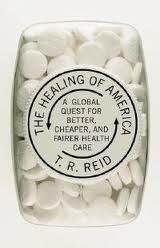Tens of thousands of citizens die each year in the U.S. because they are uninsured, or under-insured!
Yet, healthcare is the largest industry in all wealthy countries. It consumes more of the national income than either education or defense.
In the U.S., health care takes up 17% of the gross national product, which is about $7,000 per person, per year. This is twice as much as in any European country.
Why is it that all other free-market, democratic, advanced, industrialized countries manage to providing health care of high quality to everybody and spend half as much as the United States?
Why doesn’t the United States, the world’s richest country, commit to providing healthcare for everybody?
Healthcare Systems Around the World
It’s not all socialized medicine in other countries. Many countries provide healthcare to their citizen with private hospitals, insurance plans, and doctors. Traditions and cultures influence healthcare systems in 190 countries around the globe.
 According to T.R. Reid, a former foreign correspondent for The Washington Post, commentator for National Public Radio, and New York Times bestselling author of “The Healing of America: A Global Quest for Better, Cheaper and Fairer Health Care,” there are four main models of healthcare around the world. He suggests we focus on who the providers are, such as doctors, drug companies, and hospitals and who pays for the services they provide.
According to T.R. Reid, a former foreign correspondent for The Washington Post, commentator for National Public Radio, and New York Times bestselling author of “The Healing of America: A Global Quest for Better, Cheaper and Fairer Health Care,” there are four main models of healthcare around the world. He suggests we focus on who the providers are, such as doctors, drug companies, and hospitals and who pays for the services they provide.
Four Models of Global Healthcare
Great Britain, France, Italy, and New Zealand have the Beveridge Model of Health Care, named after Lord William Beveridge. When World War II was coming to an end, Sir Winston Churchill asked Lord Beveridge to write a report on British social services. Lord Beveridge proposed the National Health Services healthcare system which became a responsibility of the government to provide healthcare to the entire nation.
All the citizens of these countries never get a hospital or doctor bill their entire life. Taxes are high because the government pays for everything; however, people pay half as much for medical services because they don’t have to pay monthly premiums. The government is the provider and payer which fall into the category of socialized medicine.
Mainland Europe countries like Germany, Switzerland, Japan, Netherlands, France, and Belgium, use the Bismarck Model healthcare system which covers everybody. This system was invented by Germany’s first Chancellor, Otto Eduard Leopold von Bismarck. In 1873, he created “old-age pension,” (“social security” in the U.S.), and Workmen’s compensation. In 1883 he created the world’s first national healthcare system using private insurance plans, where everybody bought insurance and the premiums are split with other co-workers of an employer.
 The insurance plans, doctors, and hospitals are all private, with the government picking up the healthcare costs for all citizens. In the U.S. 155 million American citizens use this Bismarck Model healthcare system.
The insurance plans, doctors, and hospitals are all private, with the government picking up the healthcare costs for all citizens. In the U.S. 155 million American citizens use this Bismarck Model healthcare system.
In 1944, Canada came up with the National Health Insurance Model, also known as Medicare. Private providers like doctors, laboratories, and hospitals are privately owned and operated and the government acts as the insurance system and pays for the medical expenses. Everybody goes to the doctor for free; however the public pays a premium to the government.
In 1965, President Lyndon Johnson took the name and model of Canada’s healthcare system and offered government health insurance, Medicare, to U.S. senior citizens. Other countries that have adopted this system are Australia, South Korea, and Thailand.
Finally, the most common healthcare system, found in about 140 countries around the world, is the Out of Pocket Model. The brutal reality of this system is that if one gets ill in these countries, if you don’t have money or something to barter to pay for medical service, you can remain sick and die.
The United States uses all four of these models for healthcare. If you are a veteran, in the military, or Native American you use the Great Britain’s National Health System. U.S. citizens over 65 years old use Canada’s Medicare. If you’re an American getting insurance from your employer you’re using the Bismarck Model.
Unfortunately, if you’re one of the 140 million people living in the richest country in the world who do not have health insurance, you use the Out of Pocket system like people in Angola and Afghanistan.
Each year, tens of thousands of Americans die because they can’t afford to see a doctor.
The biggest difference with the U.S. and the other democratic, industrialized nations in the world pertaining to healthcare is that, all the other countries decided on using one system for everybody and the U.S. uses all four.
A Moral Question
 The other countries use a unified system for everybody because; it’s fairer for everybody if everybody has access to the same medical care and pay the same medical expenses.
The other countries use a unified system for everybody because; it’s fairer for everybody if everybody has access to the same medical care and pay the same medical expenses.
Healthcare reflects the moral and ethical values of a country. Though healthcare issues are political, involve medical and economic concerns, is it the responsibility of a rich nation to provide everybody medical care.
Without a moral commitment to provide healthcare to all citizens, then some people who have good insurance and money to pay for medical expenses get their needs taken care of, and those who do not have insurance and money to pay for medical services will not even get the medical care they need to get well and prolong his or her life.
Why do some countries commit and countries like the United States of America, do not?

Great blog here! Also your website loads up fast! What host are you using? Can I get your affiliate link to your host? I wish my web site loaded up as fast as yours lol
You can definitely see your enthusiasm in the work you write. The world hopes for more passionate writers like you who are not afraid to say how they believe. Always go after your heart.
I am extremely impressed with your writing skills as well as with the layout on your blog. Is this a paid theme or did you customize it yourself? Either way keep up the nice quality writing, it’s rare to see a great blog like this one these days..
Wow, marvelous blog layout! How long have you been blogging for? You made blogging look easy. The overall look of your web site is great, as well as the content!
I have been exploring for a little for any high quality articles or blog posts on this kind. Exploring in Yahoo I at last stumbled upon this website. So I am happy to convey that I have an incredibly good uncanny feeling I discovered just what I needed. I most certainly will make certain to do not forget this web site and give it a glance on a constant basis.
Great work! This is the type of info that should be shared around the web. Shame on Google for not positioning this post higher! Thanks =)
This is really interesting, You’re a very skilled blogger. I’ve joined your feed and look forward to seeking more of your excellent post. Also, I’ve shared your site in my social networks!
George I found your post on Facebook–great article! You got a nice way to lead with value versus trying to sell me on something or sending me to your opportunity. Just awesome, awesome, awesome… Keep up the good work!
Thank you, Willie! I appreciate you sharing your perspective! Take care…
Everything is extremely open and a really clear explanation. Your blog is extremely useful. Many thanks for sharing!
You’re welcome, Steve…thank you, as well…
Absolutely worth to bookmark this article. Lots of important information we can get in this web page. Superb!
Thank you, April!
Hi George,
I believe there is way to much regulation of the healthcare system and providers in the USA. I also believe that longevity is a frontier that deserves much more study and de-regulation as well. Great post as always :-)
Mark Edward Brown
Thanks for sharing your thoughts, Mark. Here are some additional thoughts to consider pertaining to healthcare in a democratic government like the United States of America. A decision on policy-making for healthcare involves private and public policymakers, politics, and the need to solve a problem. In addition, the decision must be authoritative by people who can put into action the decision. First, we must identify the “public” problem.
Since most health related issues and policies are regulated by state governments within the U.S., and state governments are inherently structured differently and unique, it’s even more difficult to provide a healthcare policy to cover healthcare. Presently, the U.S. federal government has executive department agencies that play a role in public health of the citizens of the U.S.: the Department of Health and Human Services, the Center for Medicare and Medicaid Services, the Department of Defense, and the Department of Veterans Affairs. Combined, these federal agencies provide healthcare and information to millions of U.S. residents, as well as health insurance programs for military personal and their families.
Additionally, local public health agencies handle most of the public health functions for the residents of their respective states. They provide mental health services, cancer screening, children health issues, environmental and sanitation concerns, and a variety of other health related services and issues. The biggest concern I see that needs the most improvement in healthcare in the U.S. is medical care for the uninsured and under-insured.
Great question George. I don’t know enough about the medical systems beisides what you just wrote, but it looks like America needs to get it together. As an uninsured American, I can’t even begin to tell you how hard I try NOT to get sick, and many unemployed, under-employed, and self-employed individuals are going through the same thing. There are many injustices in this country as I’m sure there are around the world, but I really feel we’re still stuck in the middle ages with our healthcare system. You know, the rich get to bathe while the peasants are lucky if they get clean drinking water. (was that too drastic?) But really, something needs to change.
I agree, Lynn! We can use some improvement…